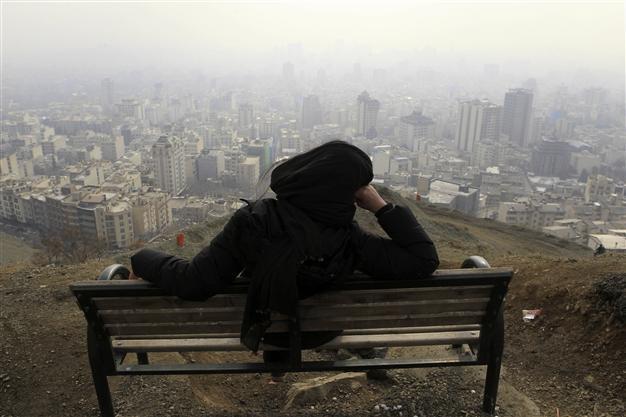Iran's parliament looks at moving nation's capital
TEHRAN - The Associated Press

In this Friday, Jan. 4, 2013, file photo, an Iranian woman sits on a bench in the Tochal mountainous area overlooking the polluted skyline of the capital Tehran, Iran. AP Photo
The Iranian parliament voted Tuesday to consider a proposal to pick another city as the nation's capital, potentially moving the seat of the government from the overcrowded and heavily polluted city of Tehran despite government opposition to the plan.Iran's official news agency IRNA said that lawmakers accepted outlines of the proposal with 110 out of 214 present lawmakers supporting it. The chamber has 290 seats.
Under the plan, a council would be set up and spend two years studying which alternate location would be best. While there's no suggestion in the bill which cities would be looked at, several central and western cities already have said they would like to be considered.
Supporters of the plan believe Tehran, with a metropolitan population of 12 million people, simply cannot support the capital. They point at the heavy pollution, the city's traffic jams, as well as the risk of earthquakes there. Iran is located on several faults and experiences a light earthquake a day, on average.
Still, moving the capital seems unlikely, due to the high cost involved.
Vice President Mohammad Ali Ansari, in charge of parliament affairs, opposes the plan and says lawmakers don't have the power to order the capital to be moved. He said relocating the capital is "part of main policies of the ruling establishment," a reference to authority of the Supreme Leader Ayatollah Ali Khamenei, who has final say on all state matters.
"It is impossible to decide about making the decision on moving without consulting his Excellency," Ansari said. He added: "Plan is not practical, indeed."
Parliament speaker Ali Larijani also opposed the plan over the cost and said the Guardian Council, a constitutional watchdog that vets the bills, likely would reject it as well.
Saeed Leilaz, a Tehran-based political-economic analyst, also said the plan isn't feasible.
"This will cost dozens of billion dollars for a government that has not enough to pay the monthly salary of its staff," Leilaz said.
Iran has been crippled by Western sanctions over its disputed nuclear power program, which has cut its access to the oil money that makes up to 80 percent of its foreign income and 50 percent of budget.
Lawmakers and officials occasionally have raised the idea over the last 50 years, even before the 1979 Islamic Revolution that ousted King Mohmmad Reza Pahlavi. U.S. advisers reportedly had asked the king to relocate the capital as it was too close to borders of the Soviet Union.
During World War I, the Iranian government decided to move the capital temporarily when Russian and British forces occupied parts of the country, though the order was never carried out.
















